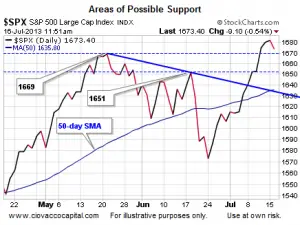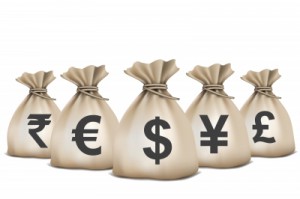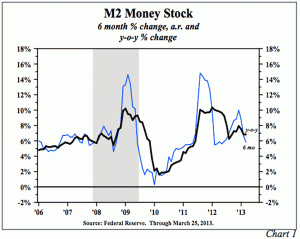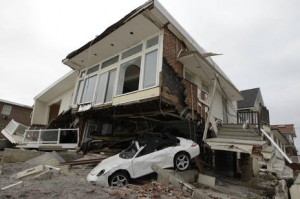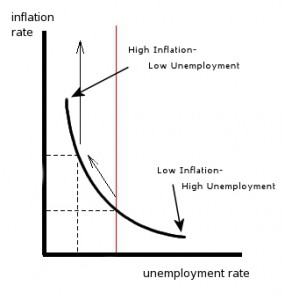Up until recently we rarely heard the word "tapering" but now it seems to be everywhere. Why? Because in June FED chairman Ben Bernanke floated a "trial balloon" and mentioned "tapering". By this he meant that he was considering slowly closing the faucet that is currently gushing easy money, i.e. $85 billion a MONTH. The stock markets promptly had a temper tantrum and Bernanke blinked and said, oh I was only kidding... I will eventually have to scale back but it won't happen any time soon... don't worry. He also said that the Fed's 6.5% target for US unemployment should be considered a "threshold, not a trigger" and that the FED would continue to support the economic recovery, "even as the … [Read more...]
Why Inflation is Theft
By Dr. Ron Paul When I talk to many teenagers and grade schoolers, they seem to have no problem comprehending the fact that if you just create a lot of money, it'll be like Monopoly money and it won't have value. Governments do that for all kinds of reasons, especially to enhance political power to fight wars we shouldn't be fighting or to pass welfare programs that aren't deserved. When you print that money, the value of that dollar has to go down, and then one of the consequences of inflating the money will be higher prices. But there are a lot of other problems, too, with inflating. It causes a business cycle, it causes financial bubbles and it causes a lot of … [Read more...]
The Effects of Tapering Off the FED’s Stimulus Program
Here's an economic irony for you. Less inflation means lower prices for you and I. However, to some who work for the Federal Reserve, that means things are off target and the economy still needs more work. Huh? What? It seems slightly fuzzy, but when you look at the larger macro-economic picture, things slowly start to come into focus. To a certain extent, inflation is actually good for the economy. The slow growth of inflation is one of many variables that is prompting speculation about whether or not the Federal Reserve should start tapering back its quantitative easing (stimulus) of the economy. Recent Inflation Drop Prompts Speculation In the May 2013 release of the April data, the … [Read more...]
Experimental (Reckless) Monetary Policy
In the following article Bill Bonner makes some excellent points about the problem with the current monetary policy. The first is that it is totally ludicrous to try to buy real goods with fake money. It has to cause distortions in the overall economy. "People make different decisions when they can borrow for practically nothing... " Secondly, once it gets started, without some form of real recovery it will be impossible to stop. Kind of like a drug addict. The withdrawal will be painful and won't happen until something forces the FED's hand. And thirdly also just like drug addicts and unsuccessful people the world over the FED is taking a short term view. It is a proven fact that the most … [Read more...]
Is Ben Bernanke “Shooting Blanks”?
Summary: Lacy Hunt and Van Hoisington launch into their first-quarter "Review and Outlook," this week with a statement that some may find eye-opening: "The Federal Reserve (Fed) is not, and has not been, 'printing money'…" But given the facts of life about how money is really created (and destroyed), they are of course right: it's all about the acceleration – or deceleration – in the M2 money supply. Van and Lacy say, "A review of post-war economic history would lead to a logical assumption that the money supply (M2) would respond upward to [the Fed's] massive infusion of reserves into the banking system. Mystery Math- Monetary Base up 350%, M2 Up 35%? And yet, the Fed's 3.5x … [Read more...]
The Economics of Disasters Like Hurricane Sandy
Many people believe the fallacy that wars and disasters are good for the economy, perhaps because some people like defense contractors and home-builders benefit. But it is important to understand how wealth works. If you build a house from raw materials you are richer. For instance suppose you take $50,000 worth of raw materials and add $50,000 worth of labor and come out with a house worth $150,000. in that case you created $50,000 worth of wealth out of thin air. But if someone comes along and knocks your house down and you rebuild it: 1) Are you better off? 2) Worse off? 3) The Same? ~ Tim McMahon, editor In this article Kerk Phillips looks at "hurricane economics". Even Economically, … [Read more...]
Why Inflation is U.S. Hottest Export
Last week, we went to São Paulo, Brazil. There, too, we found taxi drivers who knew a lot more about monetary crises than the typical US economist. Said one: I remember. I was just a kid. But my father would call and tell us to run to the grocery store. He had just been paid. We'd dash for the grocery story, meet him there and buy everything we could. We spent every cent in just a few minutes. Our friend was recalling what it was like in the late 1980s in Brazil. The government had caused inflation... then hyperinflation. Prices rose so fast that as soon as people got some cash they ran to the grocery store to spend it. Later, there was no point. In 1990, hyperinflation in … [Read more...]
Why Money Printing Makes You Poorer
Here is an excellent article by Bill Bonner on the announcement that Japan made that they are going to crank up the printing press and eliminate the deflation that has been plaguing their economy over the last twenty years. In it he explains the effects of money printing both short term and longer term. He also debunks the idea of where demand actually comes from. He says, "People always want stuff. Demand is infinite. Government doesn't have to stimulate it. What really matters is buying power."~Tim McMahon, editor Why Money Printing Makes You Poorer Last week, Japan announced that it would undertake a bold and radical experiment. After 23 years of on-again, off-again deflation, the new … [Read more...]
What is the Phillips Curve?
The Nature of the Phillips Curve The Phillips Curve is an economic concept was developed by Alban William Phillips and shows an integral relationship between unemployment and inflation. Phillips began his quest by examining the economic data of unemployment rates and inflation in the United Kingdom. He tracked the data over business cycles, and found wages increased at a slow rate when unemployment was high, and faster when the unemployment rate dropped. Business cycles are basically economic activity over a lengthy period of time. Originally, business cycles were thought to be predictable, but they have since proven themselves to be irregular in the areas of duration, frequency and … [Read more...]
What Does 8% Inflation Really Mean?
By Dennis Miller Eight percent is not good news. In my latest article I shared some reader feedback from our inflation survey, and in case you missed it, the Money Forever Reader Poll Inflation Rate is 8%. But what does that number really mean for us – seniors and savers trying to protect our buying power? It's time to read the tea leaves and find out. Up to Your Ass in Alligators You may remember the old poster that read, "When you are up to your ass in alligators, it's tough to remember the goal was to drain the swamp." You may have felt overwhelmed during the last few years, as the investment options for your retirement portfolio changed. You might read about the benefits of gold … [Read more...]

